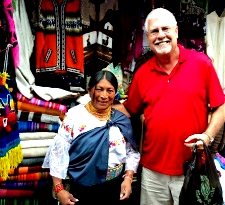 We take our two Chihuahuas for long walks and runs along 50-second beach, a long and deserted stretch of beach 50 seconds from our front door. We shop for fresh fish, freshly butchered chickens and produce at one of two large open markets each week. They are building a new, multi-level mall just across the bay complete with a movie theater and a modern super market and if we want to connect with nature, we drive into the jungle of the Rio Muchacho Valley about 35 minutes from our home.
We take our two Chihuahuas for long walks and runs along 50-second beach, a long and deserted stretch of beach 50 seconds from our front door. We shop for fresh fish, freshly butchered chickens and produce at one of two large open markets each week. They are building a new, multi-level mall just across the bay complete with a movie theater and a modern super market and if we want to connect with nature, we drive into the jungle of the Rio Muchacho Valley about 35 minutes from our home.
For me, a life without stress is the very best thing about retirement on Ecuador’s coast. The pace here is slow, the people are friendly and our Spanish is improving every day. It has been nearly two years and we do not have one regret!
While Diane and I love the coastal lifestyle, there is a large and growing nest of expats living in Cuenca, a city that has been regularly named as the world’s number one retirement destination. It’s a bit too high (approximately 9000 feet above sea level) in the Andes Mountains for my health and comfort but it is a great city with a developed infrastructure and a supportive group of expats. There are other pockets of expats living in most cities and scattered up and down the coast.
Before packing your bags, carefully examine yourself. The fact is that while Diane and I are quite happy here, some folks living in the same area are not happy. Some come here and cannot adjust to learning a new language in a culture that is nothing like the one they left. You truly need to speak Spanish and learn you will. There is no choice and yet some resist. Yes…it is difficult but doable! You don’t need to speak textbook perfect Spanish. You just need to convey your thoughts even if you sound like Tarzan. Knowing how to say, “Me thirsty, need water” is better than not knowing how to ask for water at all.
While some resist learning the language and are unable to embrace the culture, others long for family “back home” and after a year or so return to the grand-kids to collect all the hugs they have missed. You must truly bring your happy with you and be prepared for an entirely different existence than the one you left at the departure gate. Ecuador is not “United States Light” with half the expenses. It is an emerging nation where power distribution and Internet services are significantly less reliable than those in the states. Stores will not always have the products you seek and you learn to do without or substitute. The laws and justice system are entirely different as is the business culture. What one may find charming and interesting, others may find completely intolerable.
Our initial budget upon arrival in Ecuador was $1500 per month. That included renting a completely furnished condo, food, Direct TV, Internet and all other living expenses including putting a small amount into savings each month. We lived a very nice life for $1500 per month. As our comfort level increased along with our monthly income, we added some things to include a car, a motor scooter and a housekeeper. Like most other places on the planet, living on the coast costs a bit more than living inland. Property values, including rent (while significantly cheaper than those in the U.S.) account for much of the increase.
At the time of this writing, I believe a couple can live a very nice life within a budget range of $1300-$2000 per month. Some who are comfortable with more modest accommodations may be able to live for less and you can certainly spend more.
If you are one of those who insist that the details or your life fall into precise order and you become upset when things don’t go exactly right…well, Ecuador will be a challenge for you. Ecuador has much to offer and for many, including Diane and I, as a new way of life has been eagerly embraced. We are living a much happier, healthier stress-free life, filled with adventure, on far fewer dollars than we could in the states.
Click for other information about Ecuador.

July 26, 2014 at 6:10 am
Loved reading this. Great life story. Although we are not retired, when we became empty nesters with the last of our three sons finishing high school, we left the US for a new life in Nicaragua. We lived there for SIX years – started a social and environmental impact business buikding eco bamboo housing for indigenous populations. We are now living in SEAsia with a more nomadic lifestyle, yet wrote plenty on our blog about our transition to and lives in Nicaragua.